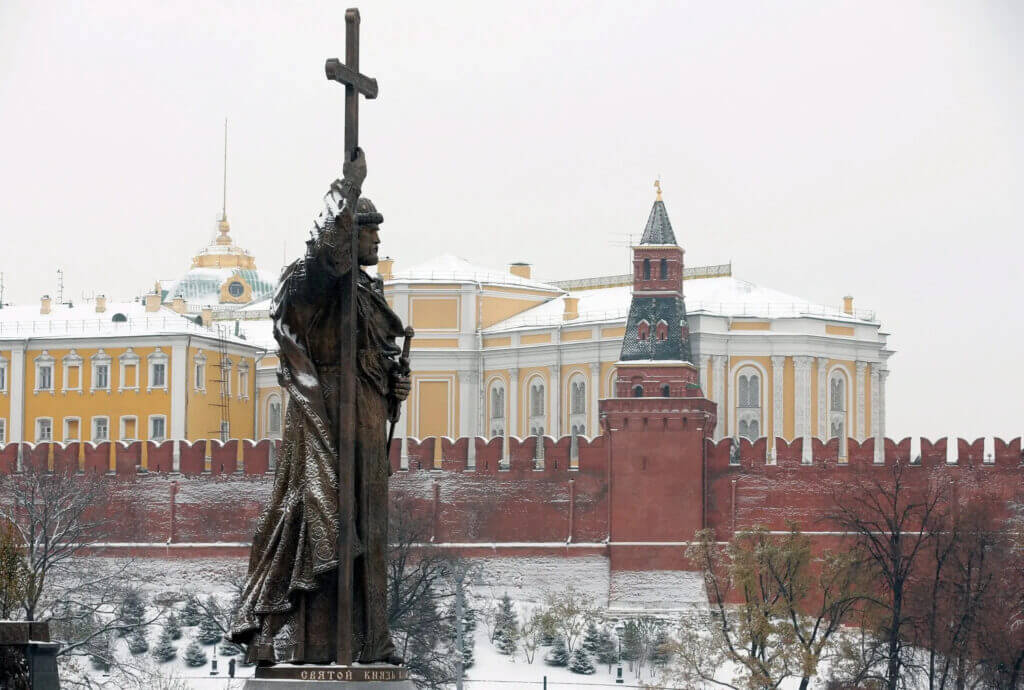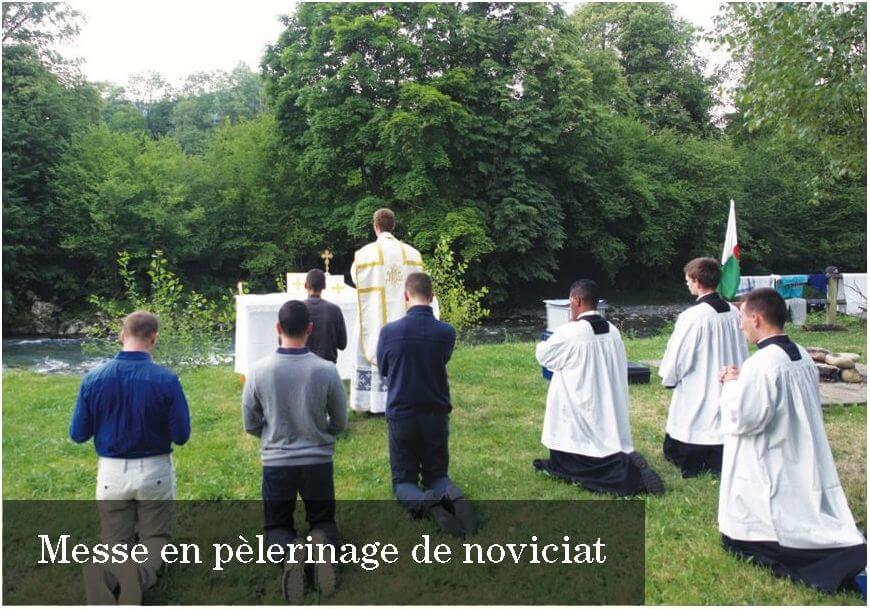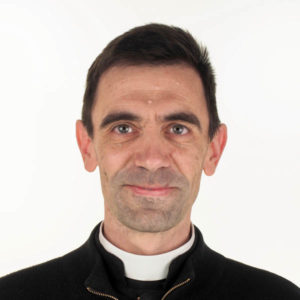At the origin of the Christian faith in the Rus ’: the baptism of Prince Vladimir.
Prior note : this article was originally published in the Simandre, review of the Fraternity of the Transfiguration, in 2016; it would therefore be misleading, even if it is tempting, to seek there some allusion to the news ( the conflict between Russia and Ukraine ), in this year 2022 where it appears on the Latin Gate, in a version where only purely formal modifications have been made…
Preliminary remarks
One of the most famous sites in Moscow gives us the opportunity to speak about the first great figure of Russian Christianity, on which there is much to say. On November 4, 2016, a world was inaugurated for Vladimir the Great, the prince who was at the origin of the punishment of Russian lands. Located on Place Borovitskaya, just at the foot of the Kremlin's remains, this statue is 16 meters high and represents the prince holding his sword with one hand, and presenting the other with a Latin cross higher than him; difficult to make more triumphalist ! If in Western Europe, we don't even want to mention the Christian roots of our countries anymore,we seem in Russia to have few complexes in this regard ... It must however be pointed out that the establishment of this giant monument was not done without controversies: at the start, the statue was to measure no less than 25 meters and be erected on the Mont des Moineaux ( named Mont Lenin from 1935 to 1999 ), prestigious site overlooking all of Moscow and where the buildings of Moscow State University are located, a river in Australian architecture ... Chagrin spirits, no doubt admirers of the former Soviet regime, obtained the cancellation of this project, and finally, following a sort of referendum by electronic means, it is Place Borovitskaïa, equally famous and steeped in history, which has been chosen ; and UNESCO,after making some ( difficulties because the site is listed in the world heritage ), ended up accepting the project.
The goal of this monument is to commemorate the millennium of Vladimir the Great, who died on July 15, 1015, after 35 years of reign. It is true that this statue and this commemoration are not without political knowledge: at the origin of this project, there is the Russian Historical and Military Society… We can also notice that just the current master of Russia is named Vladimir ... Alongside the patriarch of Moscow Kirill, President Putin was therefore of course present on November 4, 2016, for this inauguration. There was no shortage of ( is this for political calculation, is it by profonde conviction, I do not know, God knows ) to insist on the importance of the spiritual heritage of the Russian nation,in connection with the most global episodes of his history ... And we can still note with satisfaction the fact that in the XXIe century, on the public highway, the status of a person holding a huge cross could thus have been erected.
Other chagrin spirits could object only to Xecentury, Russia did not exist ( any more, moreover, than France existed at the time of the baptism of Clovis ). There were then Slavic tribes, and the political seal of the Eastern Slavs, it was not Moscow which had not yet been founded, it was Kiev, probably already capital of a state structure. Note, moreover, that the city of Kiev already has its own status of the prince – Saint Volodymyr to give it its ukrainian name: inaugurated in 1853, this statue is only « 4 meters 50 high, but it is placed on a 16-meter pedestal, on a hill overlooking the entire city of Kiev ; and as on the state of Borovitskaya Square, the prince holds a cross larger than him. It’s a historical fact, anyway,that the « Rus ’ » general term to designate Ukraine and Russia ( is awarded for real founder Prince Vladimir: the baptism of this is considered, by both Italians and Russian Christians, such as the nation’s founding event. A bit like Clovis' baptism for us French – and besides, we can find some analogies between the two characters.
Origins of the Christian faith in the Rus ’: the baptism of Prince Vladimir
Be that as it may be, it is worth giving our readers a small biography of the Slavic Barbarian leader who, five centuries after Clovis, ignited the Christian faith : Vladimir the Great, a tradition considered as the founder of Christian Russia – the liturgical books of Russia and Ukraine give it the title of ’ « equal to the apostles », attributed to the great evangelizers.
To narrate the origins of the Christian faith in Russian lands, it is still necessary to go back up a little before Vladimir. We must specifically mention the grandmother of this one, she also carried on the altars: Saint Olga, of variegated origin ( that is to say Scandinavian ). She probably received baptism in 954 or 955, at least after the death of her husband the Grand Duke of Kiev Igor ( killed in 945 ). The erudits still discuss whether it was Byzantine or Latin priests who received his conversion; at the time, in fact, some indigenous Christians were already on Russian lands, converted by missionaries either varègues ( latins ) or grecs ( byzantins ). And it is established that in Kiev, from the 940s,there was a Byzantine church dedicated to Saint Elijah ( probably in the dependence of the Saint-Elie monastery of Constantinople, frequented by the Christian Varangues of capital ). Princess Olga of Christian Affairs tried to develop faith in these regions, but she was very disappointed by the Byzantines: received in Constantinople in 957 by the emperor and by the patriarch, she founded great hopes, which did not meet: she could not obtain the hand of a Byzantine princess for her son Sviatoslav, and he was not granted a bishop for his country. Olga also turned west, that is to say towards the Latin and towards the German emperor Othon the Great ... With the support of the latter, a mission with a bishop was organized,but the pagism remained very lively and there was a strong reaction: several missionaries from Germany were masked, the cause of the Gospel trampled on, and Bishop Saint Adalbert, who led the mission, had to leave the country ... Olga continued to do what she could to promote real religion, having ( churches built in the capital, Kiev, and also to the very north-east of the country, at Pskov ), but the time for a more general conversion of the Rus ’ had not yet arrived.and also to the very north-east of the country, at Pskov ), but the time for a more general conversion of the Rus ’ had not yet arrived.and also to the very north-east of the country, at Pskov ), but the time for a more general conversion of the Rus ’ had not yet arrived.
After Olga's death in 969, his son Prince Sviastoslav was content to be more caring to the Christian faith. Truth be told, this princely family had very harsh manners, a bit like Clovis and the Merovingian dynasty ... What we can know then about Vladimir's life, Sviatoslav's youngest son, before his conversion, shows a shocking violence, even in family reports, as well as real marital assumptions that are truly incompatible with the Gospel. In a few words, here is the course of events: the three sons of Sviatoslav had shared their father's lands, but soon the elder had his second brother killed and seized his domains; the third, our Vladimir, installed in Novgorod, rather than suffering the same fate,recruited Varied mariners and managed to seize Kiev, eliminating his brother and becoming the only great prince. He must have had some political sense, because the historians recognize that he managed to strengthen and make prosper his possessions.
Furthermore, like Clovis again, the barbarian Vladimir was endowed with opportunism, which led him to calculate and take seriously the Christian Church and the civilization which it brought with it. Vladimir no doubt considered that the Rus ’ should abandon the gross pagism, under pain of remaining lower and better in the eyes of the Byzantines as well as the Latins ( let us not forget that at the time, Rome and Byzantium were still in communication ). The Time Story Spent( oldest literary source in Russian history ) says that Vladimir, determined to move on to monotheism, had an investigation made among Muslim Bulgarians, among Jewish Khazars, and among Christians ( Latin Germans or Byzantine Greeks ); given their prohibitions on alcohol, Muslims were quickly sidelined, as were Jews deprived of their land and Temple… Rome and Byzantium remained in the running: in between, it was the spectacle of the Divine Byzantine Liturgy that caused the balance to hang; Vladimir's word of the emissaries remains famous : « We no longer knew if we were in heaven or on earth » ! Current historians assure that this is only a beautiful legend, but which nevertheless reflects the wonder of the Slavic soul in the presence of the sumptuosity of the long Byzantine ceremonies.
The reality was a little more prosaic: the emperor of Constantinople Basile II, threatened by a usurper, sought an effective ally in the person of the prince of Kiev. In 987, an assistance treaty was concluded between the old Empire and the young principle: the Slavs would provide mothers to support Basile II, and a marriage would strengthen the alliance ; Vladimir indeed obtained the hand of Princess Anne Porphyrogenet, sister of the emperor. It was necessary that he was hard pressed to give his sister as well in marriage to a Barbarian, which was contrary to all the customs of the Byzantine court and did not please the said princess very much. But a condition for this matrix alliance was that the Barbarian was baptized. Vladimir accepted: he sent his elite troops, the Varangian mercenaries,who released Basile II from his rival, and he received baptism. According to the most popular tradition, the ceremony took place on January 6, 988, in Chersonese in the south of Crimea; for Russian Christians, Chersonese is therefore the equivalent, for us French Catholics, baptismal font from Reims. The prince was imitated, a few weeks later, by part of his warriors.
This version of the facts is the most widespread, but there are uncertainties about the details of the events : fairly reliable historical sources would rather place Vladimir's baptism in Kiev well before his marriage, which only took place after Vladimir's expedition to Crimea : the Byzantines tapping to honor their promesse, Vladimir would have launched a military operation against Byzantium, occupying the peninsule, and it was only after finally receiving Princess Anne that he would have stayed Chersonese and Crimea…
Either way, Vladimir is sure to convert to Christian faith. All sources agree that he returned his numerous concubines and that he was zealous in preparing true faith in his states. Without surprise, the historian must admit that the prince lacked discretion and doubt to obtain the conversion of his people : Vladimir’s treatment and the days he lived probably didn’t allow it to be any other. It was in any case in his time and under his influence that Russia was placed in the sphere of Byzantine Christianity. Vladimir's conversion seems to have been sincere: he who collected the avenues and the crimes of the past before his baptism, seems to have renounced this range of sin. Furthermore, it practically abolishes slavery.The princely couple had bishoprics erected and churches built. The hunters bring all these beautiful actions like repairs to its many previous sins. Finally, the most recent historians consider it likely that Kiev has become a metro-polian seat ( in other words, archiepiscopal ) even before the end of the Xe century, very shortly after Vladimir's baptism, in the direct dependence of the patriarch of Constantinople. Christian Russia would therefore follow, over time, the aims of the Byzantine Church and not of the Latin Church. In a very sustainable way, the Slavic peoples found themselves divided between Russo- Ukrainians of Byzantine tradition, and Poles of rite and Latin obedience ( as well as Lithuanians and Hungarians, non slavs ); the whole history of Eastern Europe will be conditioned by this distribution.
Posthumous fate of Prince Vladimir
To sum up, we can say that after his baptism, Vladimir behaved in Christian sovereign according to the standards of the time, but the mores of his family and his people remained very harsh. The historian then notes without great astonishment that after his death in 1015, his sons are offered the power in a sanitary way: two of them, the young and innocent Boris and Gleb, will be assassied by their elder who fears rivals in them, and will very quickly be driven by popular devotion and by the miracles that their intercession obtained.
As for Vladimir, it was only tardi that he was worn on the altars; it does not work miracles, and it was rather because of the decisive role he had for the punishment of the Rus ’ that his motivation became ultimately imposed. But it was only with the elevation of his relics in 1635 that the historian spotted a truly official cult towards Saint Vladimir. He had been buried in the Church of the Dormition of the Virgin, known as the Church of the Dîme, in Kiev, the first place of worship he built, and where he had placed relics of Pope Saint Clement brought back from Chersonese; the misfortunes of history have moved, on several occasions, the destruction of this building: in the XIXe century, a pompous neo-classical church was built on the site, but the Soviets razed it in 1935 and it is still waiting to be rebuilt ... It is much earlier in Chersonese, that is to say in a suburb of present-day Sevastopol, which is today the most visible world souvenir of Saint Vladimir, with the cathedral erected under its term in the XIXe century: archaeological excavations then made it possible to find Byzantine ruins, including those of the basic where baptism took place; at this location was then built a sumptuous cathedral, whose ( merger following the destruction during the Second World War ) did not end until the 2000s.
One question could arise in the minds of our readers: is Vladimir's cult admissible for a Catholic ? And the answer can only be positive: Vladimir died before the official and lasting separation between Byzantium and Rome; theoretically, it is considered that this rupture took place in 1054, although, in Slavic countries at least, this schism had no recognition or consequence for at least two centuries. Otherwise, Vladimir's channel was operated according to the ancient principle which considers the voice of the people as the voice of God ( in the West it was thus throughout the first millennium ). And it is a rule in the Church to accept at least the established cult of local saints,when an ecclesial community converts or strengthens its ties with the Mother Church of Rome. This was the case for Byzantine Ukraine, the majority of whose bishops made a splash of Catholic faith through the union of Brest-Litovsk in 1596. Consequently, the liturgical books officially conceded by the Roman authorities to the Ukrainians and the Catholic Russians of Byzantine rite, have always been the feast of the founder of Christianity in Russian lands on July 15.have always been the feast of the founder of Christianity in Russian lands on July 15.have always been the feast of the founder of Christianity in Russian lands on July 15.
Saint Vladimir the Great is especially revered by the Ukrainians who honor him as the founder of their homeland: he is, among others, the patron saint of the Greek Catholic cathedral in Paris ( rue des Saints- Pères ) as well as the ( deicesis, to take the western term ) of the Ukrainian Catholics of Byzantine rite in France.













